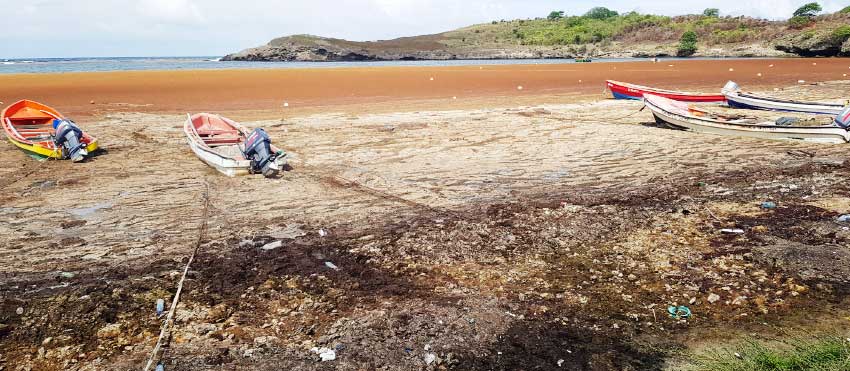IN more recent years, the word ‘Sargassum’ has been heavily linked to and associated with the fishing village of Praslin.
Oftentimes, many people remark upon the awful smell that they take inside their cars, as they drive through. That’s quite understandable.

However, VOICE investigations reveal that the Sargassum problem is far deeper than many may believe – and an impact more widespread than just the unpleasant smell.
On a visit to Praslin, fishermen there said the conditions in Micoud are even worse. The seaweed has piled up and can be seen well over 100 metres away from shore, in what can be described as ‘a sargasso desert’, covering what once was sea, entrapping fish and fishing boats alike, killing fish and causing mechanical damage to the engines of the fishing boats.
Some Praslin residents pointed out that the dead and dying fish eventually breed worms, which have invariably infected and continue to affect the lives of the fishers. Boat engines get damaged after becoming entangled and have to be hauled to and from the sea.
Micoud village was no different, as the sargassum problem there is in fact even worse than the one in Praslin — the distance of the shore from the main road being the only thing preventing the smell from affecting passersby, as in Praslin. (Although our most recent trek down the east coast has seen spread of the nasty smell even to the main road next to Micoud village, all the way through the main road next to the Desruisseaux gap.)
As we drove through Micoud, the smell was akin to Praslin – and the sight even more jaw-dropping than at the other fishing village.
The unique (and even more devastating) thing about the situation at Micoud is the absence of a jetty, worsening the already-difficult task of the fishermen.
Persons have to use vehicles to drag their fishing vessels back to “shore” through the “Sargasso desert”, a luxury they simply do not have, when setting out.
A fisherman even challenged visitors to come see what they have to go through on mornings, as getting their boats out of the “Sargasso desert” takes hours and costs them plenty.
Perhaps, even more daunting than the Sargassum problem that both Praslin and Micoud villages currently face, is the clean-up work that needs to be done.
Recently, Prime Minister Allen Chastanet said, “This is not just a St. Lucia phenomenon, it’s a regional phenomenon. In fact, there are islands in the Caribbean in which hotels have been closed down because of what’s taken place.”
He continued saying that “when it [the sargassum] starts coming onto shore and starts drying up, the creatures within start dying, and the coastline starts smelling, and so the best thing is to be able to bury it.”
Despite speaking with confidence about the process of turning the seaweed into fertilizer currently being undertaken by the young local entrepreneur JohananDujon, Chastanet was also very clear in his conclusion about the seaweed problem: “It’s not going away,”
After referencing Dujon, who’s been “converting the sargassum into fertilizer” he added that the Government has decided “to help support him, [and] get the stuff cleared up in the affected areas Savannes Bay, Micoud, Dennery and Praslin…
“There’s a lot of habitation in close proximity, so over the next couple of months we’re going to be working to determine how much of this stuff can be processed, because the plant that he has right now is only at 20% capacity.
“So, we want over the next 6 months to collect the sargassum, cultivate it, see how much we can convert into the fertiliser.”
He conceded that although this is what the government is attempting to do in order to help alleviate the problem, it also knows that “Sargassum is not going away. All indications are that it’s going to continue to grow. And so, this is a new expense that we’re all having to bear.”
Chastanet also spoke about other more technological solutions that have been espoused, but says that those have not resolved this issue either.
He spoke about the “technologies out there they say that prevent seaweed from coming on shore, but that has not worked out.”
As the PM concluded and all the residents of the affected communties here and across the Caribbean are experencing, the Sargassum problem is just not about to go away – and we may not have seen all there is to see!







![Attendees at the UHC logo and website launch [Photo credit: GOSL]](https://thevoiceslu.com/wp-content/uploads/2026/02/Attendees-at-the-UHC-logo-and-website-launch-380x250.jpg)






![Remnants of an alleged drug boat blown up in a lethal strike by the U.S. military last week surfaced off Canouan on Saturday [Photo credit : St Vincent Times]](https://thevoiceslu.com/wp-content/uploads/2026/02/Remnants-of-an-alleged-drug-boat-blown-up-380x250.jpg)
